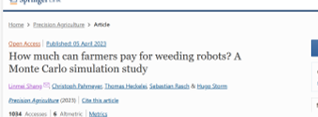The new MIND STEP publication is available on the Precision Agriculture Journal. The title is: How much can farmers pay for weeding robots? A Monte Carlo simulation study. This Open Access publication was uploaded on 5 April 2023.
Abstract: This paper investigates the Maximum Acquisition Values (MAVs) of weeding robots and their determinants in both organic and conventional sugar beet farming in Germany. The MAV is defined in this paper as the price of the weeding robot that renders the same net profit as the current weeding methods. For our analysis, a Monte Carlo simulation approach is used, combined with empirical data and data collected from weeding robot companies. The results show that the MAVs of mechanical weeding robots for organic farming are substantially higher than that of spot spraying robots for conventional farming. Technology attributes are more influential than labour cost in determining the MAVs of weeding robots: in organic farming, technology attributes such as area capacity and weeding efficiency impact the MAVs of mechanical weeding robots the most; in conventional farming, supervision intensity and the robot’s ability to save herbicides are the most influential factors. The wage rate of unskilled labour, relevant for manual weeding, plays a more important role in determining the MAVs than that of skilled labour, relevant for supervision of the robot. This implies that a shortage of seasonal workers and hence increases in the wage of low-skilled labour could be important drivers of the adoption of mechanical weeding robots. Plot characteristics such as plot size and mechanisation level only have limited impacts on the MAVs.
You can access the publication here.

